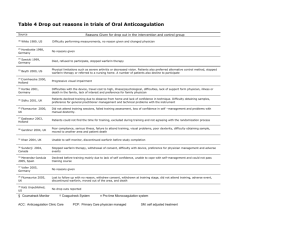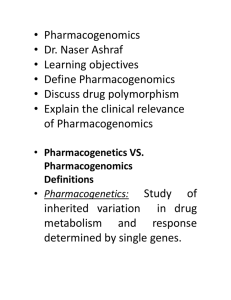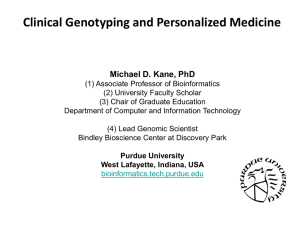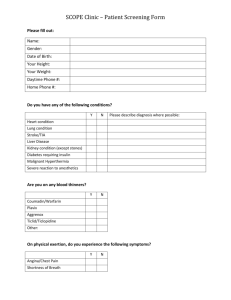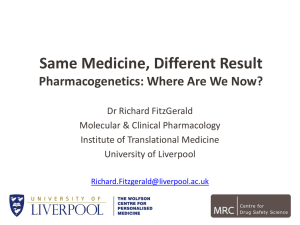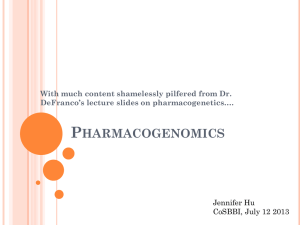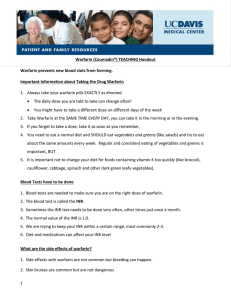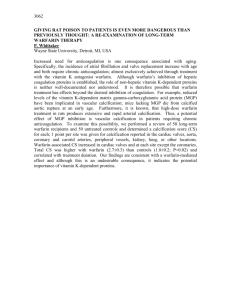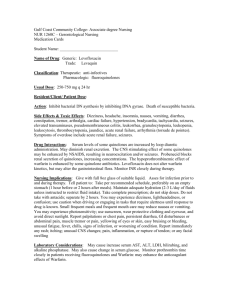Document 13309731
advertisement
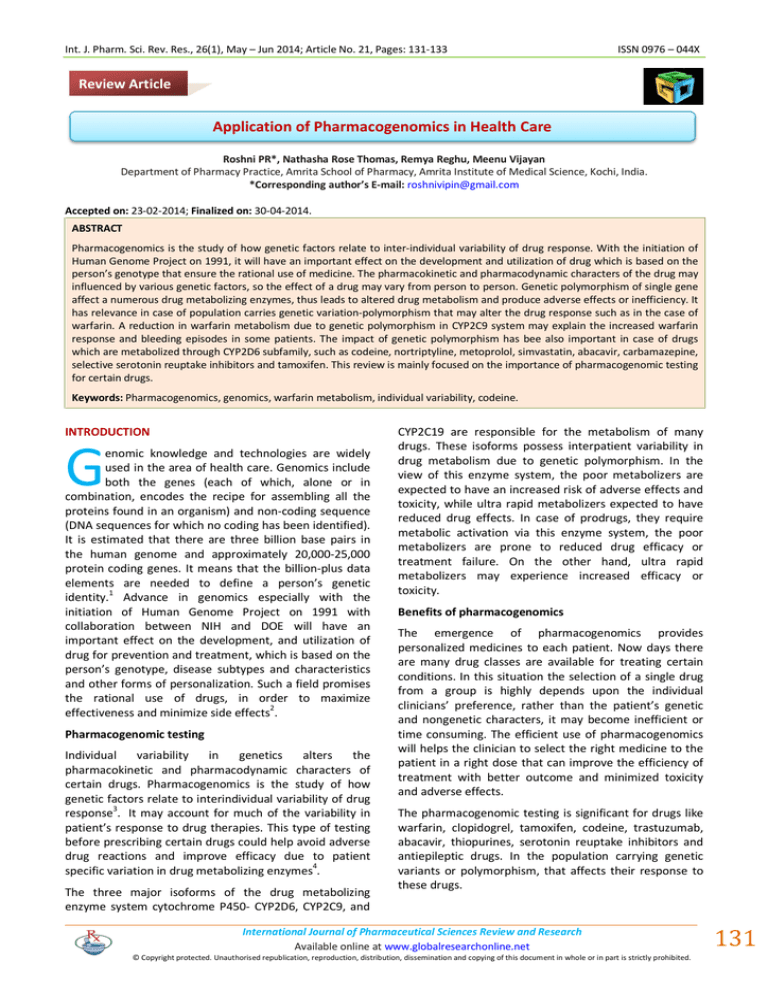
Int. J. Pharm. Sci. Rev. Res., 26(1), May – Jun 2014; Article No. 21, Pages: 131-133 ISSN 0976 – 044X Review Article Application of Pharmacogenomics in Health Care Roshni PR*, Nathasha Rose Thomas, Remya Reghu, Meenu Vijayan Department of Pharmacy Practice, Amrita School of Pharmacy, Amrita Institute of Medical Science, Kochi, India. *Corresponding author’s E-mail: roshnivipin@gmail.com Accepted on: 23-02-2014; Finalized on: 30-04-2014. ABSTRACT Pharmacogenomics is the study of how genetic factors relate to inter-individual variability of drug response. With the initiation of Human Genome Project on 1991, it will have an important effect on the development and utilization of drug which is based on the person’s genotype that ensure the rational use of medicine. The pharmacokinetic and pharmacodynamic characters of the drug may influenced by various genetic factors, so the effect of a drug may vary from person to person. Genetic polymorphism of single gene affect a numerous drug metabolizing enzymes, thus leads to altered drug metabolism and produce adverse effects or inefficiency. It has relevance in case of population carries genetic variation-polymorphism that may alter the drug response such as in the case of warfarin. A reduction in warfarin metabolism due to genetic polymorphism in CYP2C9 system may explain the increased warfarin response and bleeding episodes in some patients. The impact of genetic polymorphism has bee also important in case of drugs which are metabolized through CYP2D6 subfamily, such as codeine, nortriptyline, metoprolol, simvastatin, abacavir, carbamazepine, selective serotonin reuptake inhibitors and tamoxifen. This review is mainly focused on the importance of pharmacogenomic testing for certain drugs. Keywords: Pharmacogenomics, genomics, warfarin metabolism, individual variability, codeine. INTRODUCTION G enomic knowledge and technologies are widely used in the area of health care. Genomics include both the genes (each of which, alone or in combination, encodes the recipe for assembling all the proteins found in an organism) and non-coding sequence (DNA sequences for which no coding has been identified). It is estimated that there are three billion base pairs in the human genome and approximately 20,000-25,000 protein coding genes. It means that the billion-plus data elements are needed to define a person’s genetic identity.1 Advance in genomics especially with the initiation of Human Genome Project on 1991 with collaboration between NIH and DOE will have an important effect on the development, and utilization of drug for prevention and treatment, which is based on the person’s genotype, disease subtypes and characteristics and other forms of personalization. Such a field promises the rational use of drugs, in order to maximize effectiveness and minimize side effects2. Pharmacogenomic testing Individual variability in genetics alters the pharmacokinetic and pharmacodynamic characters of certain drugs. Pharmacogenomics is the study of how genetic factors relate to interindividual variability of drug response3. It may account for much of the variability in patient’s response to drug therapies. This type of testing before prescribing certain drugs could help avoid adverse drug reactions and improve efficacy due to patient 4 specific variation in drug metabolizing enzymes . The three major isoforms of the drug metabolizing enzyme system cytochrome P450- CYP2D6, CYP2C9, and CYP2C19 are responsible for the metabolism of many drugs. These isoforms possess interpatient variability in drug metabolism due to genetic polymorphism. In the view of this enzyme system, the poor metabolizers are expected to have an increased risk of adverse effects and toxicity, while ultra rapid metabolizers expected to have reduced drug effects. In case of prodrugs, they require metabolic activation via this enzyme system, the poor metabolizers are prone to reduced drug efficacy or treatment failure. On the other hand, ultra rapid metabolizers may experience increased efficacy or toxicity. Benefits of pharmacogenomics The emergence of pharmacogenomics provides personalized medicines to each patient. Now days there are many drug classes are available for treating certain conditions. In this situation the selection of a single drug from a group is highly depends upon the individual clinicians’ preference, rather than the patient’s genetic and nongenetic characters, it may become inefficient or time consuming. The efficient use of pharmacogenomics will helps the clinician to select the right medicine to the patient in a right dose that can improve the efficiency of treatment with better outcome and minimized toxicity and adverse effects. The pharmacogenomic testing is significant for drugs like warfarin, clopidogrel, tamoxifen, codeine, trastuzumab, abacavir, thiopurines, serotonin reuptake inhibitors and antiepileptic drugs. In the population carrying genetic variants or polymorphism, that affects their response to these drugs. International Journal of Pharmaceutical Sciences Review and Research Available online at www.globalresearchonline.net © Copyright protected. Unauthorised republication, reproduction, distribution, dissemination and copying of this document in whole or in part is strictly prohibited. 131 Int. J. Pharm. Sci. Rev. Res., 26(1), May – Jun 2014; Article No. 21, Pages: 131-133 Warfarin Warfarin is a commonly prescribed anticoagulant which has a narrow therapeutic range. The response to warfarin therapy will depend upon various patient related factors such as age, sex, race, diet, the genetic variation in the drug metabolizing enzyme (CYP2C9) and drug target gene (VKORC1). It suggests that pharmacogenomic testing may allow more patients to safely benefit from warfarin therapy. CYP2C9 is the major metabolizing enzyme of S-warfarin, which is more potent than the other isomer of warfarin (R-warfarin). People with CYP2C9*1 allele or wild type variant possess normal warfarin metabolic capacity, they are also called extensive warfarin metabolizers. On the other hand those who possess two polymorphic variants CYP2C9*2 and CYP2C9*3 allele have less capacity to metabolize warfarin, thus associated with decreased warfarin activity, diminished warfarin clearance and reduced warfarin dosage requirements. The standard dosing regimen of warfarin, in a person carrying CYP2C9*2 or CYP2C9*3 allele leads to warfarin toxicity or increased risk for bleeding due to reduced warfarin metabolism. These variant carriers only require low initial dose of warfarin, as CYP2C9*2 reduce warfarin metabolism by 30%, and CYP2C9*3 reduce warfarin metabolism by 90%. The variant take longer than normal time, up to 4 weeks to achieve the target INR. 5, 6, 7 Codeine Genetic polymorphism have been well established in the CYP2D6 family, which is responsible for the metabolism of many drugs such as codeine, nortriptyline, metoprolol, Selective Serotonin Reuptake Inhibitors (SSRIs), simvastatin and tamoxifen. A large number of women receives codeine for obstructive pain while breast feeding, which is metabolized through CYP2D6. A person with two non-functional alleles at CYP2D6 is considered to have poor metabolism, whereas a person with one or two functional allele is considered to have extensive metabolism, and one who has duplicated or amplified active CYP2D6 gene is considered to have ultra rapid metabolism. At conventional doses, subjects who are poor metabolizers of CYP2D6 genotype will get no therapeutic benefit from codeine because it will not convert into its active form. Conversely subjects who are ultra rapid metabolizers of codeine have higher than expected morphine levels, results in more side effects and shorter than expected duration of pain control. 8 Case was reported on fatal opioid poisoning in a breast fed neonate whose codeine prescribed mother was a CYP2D6 ultra 9 rapid metaboilizer. Tamoxifen ISSN 0976 – 044X convert into 4-hydroxy tamoxifen and endoxifen, which have greater affinity towards estrogen receptors and the potency to suppress estrogen dependent breast cancer cell proliferation. It has been suggested that the genetic polymorphism of CYP2D6 influence the plasma concentration of the active metabolites of tamoxifen and thus the clinical outcome. Genetic polymorphism in other metabolizing enzymes also contributes to individual variation in tamoxifen metabolism, including other CYP isoforms such as sulfotransferases and UDPglucuronosyltransferases, but their contributions are less10. Trastuzumab Trastuzumab (Herceptin) is one of the treatment choices for breast cancer. It is a monoclonal antibody which binds to the human epidermal growth factor receptor 2 protein (HER-2), the binding leads to cellular cytotoxicity by inhibiting proliferation of cells which over express HER-2 protein. So the therapy with trastuzumab is effective only in patient who possess over expressed HER-2 gene. It recommended the assessment of HER-2 over expression and gene amplification by immunohistochemistry (ICH) or fluorescence in situ hybridization (FISH) prior to the therapy. Abacavir Abacavir is a nucleoside reverse transcriptase inhibitor. It is a component in the HAART regimen for the treatment of HIV infection. The drug is well tolerated in most of the patients, but 2.3-9% of people who receive abacavir therapy developed serious life threatening hypersensitivity reactions. The symptoms of abacavir induced hypersensitivity reactions- fever, skin rashes, fatigue, gastrointestinal symptoms and respiratory symptoms are developed within 6 weeks of initiation of therapy and resolved within 72 hours after the withdrawal of the drug. While correlating these reactions with genetics, patient who carrying HLA-B*57:01 allele are at higher risk for developing this abacavir induced hypersensitivity reactions. The FDA recommends genetic testing for HLA-B*57:01 allele before staring the drug therapy and the therapy is not recommended in patients 12 testing positive for the HLA-B*57:01allele. Carbamazepine The antiepileptic drug carbamazepine has the potential to produce cutaneous reactions like Stevens-Johnson syndrome and toxic epidermal necrolysis in those who have HLA-B*15:02 allele. The US FDA added black box warning on carbamazepine to recommend test for HLAB*15:02 allele especially in Asian population. The prevalence of HLA-B*15:02 allele is higher in South Asian 13 population than in North Asians. Azathioprine Tamoxifen is an estrogen receptor antagonist, widely used for the treatment of breast cancer. Tamoxifen is a prodrug requiring metabolic activation via CYP2D6 to Azathioprine (AZA) and 6-Mercaptopurin (6-MP) are widely use for the treatment of inflammatory bowel disease. Azathioprine is a prodrug that metabolized to 6- International Journal of Pharmaceutical Sciences Review and Research Available online at www.globalresearchonline.net © Copyright protected. Unauthorised republication, reproduction, distribution, dissemination and copying of this document in whole or in part is strictly prohibited. 132 Int. J. Pharm. Sci. Rev. Res., 26(1), May – Jun 2014; Article No. 21, Pages: 131-133 MP. The catabolism of these drugs is mediated by the enzyme Thiopurin Methyltransferase (TPMT). The most common variants of TPMT are TPMT*2, TPMT*3A and TPMT*3C. About 89% of the population have normal or high TPMT enzyme activity, 11% have low activity, while 0.3% of the population possess two copies of these variant allele so they have negligible TPMT activity. This variability in the enzyme activity will result into higher chance of bone marrow suppression in people who possess reduced TPMT activity due to the conversion of 6MP to produce higher levels of 6-TG. It requires azathioprine dosage reduction up to 90%. 14 5. Epstein RS, Moyer TP, Aubert RE, J Am Coll Cardiol.Warfarin genotyping reduces hospitalization rates results from the MM-WES (Medco-Mayo Warfarin Effectiveness study). PubMed., 55, 2010, 2804–2812. 6. Au N, Rettie AE. Pharmacogenomics of 4-hydroxycoumarin anticoagulants. . Drug Metab Rev., 40, 2008, 355–375. 7. Shiew-Mei Huang, Federico Goodsaid, Atiqur Rahman, Felix Frueh, and Lawrence J. Lesko. Application of Pharmacogenomics in Clinical Pharmacology. Toxicology Mechanisms and methods. 16( 2-3), 2006, 89-99. 8. Crews KR, Gaedigk A, Dannenberger HM, Clinical pharmacogenetic implementation consortium (CPIC) guidelines for codeine therapy in the context of cytochrome P4502D6 (CYP2D6) genotype. Clinical Pharmacology & Therapeutics, 91, 2012, 321. 9. P Madadi, CJD Ross, MR Hayden, BC Carleton, A Gaedigk, JS Leeder and G Koren. Pharmacogenetics of Neonatal Opioid Toxicity Following Maternal Use of Codeine During Breastfeeding: A Case–Control Study. Clinical Pharmacology & Therapeutics, 85, 1, 2008, 31–35. DISCUSSION AND CONCLUSION Pharmacogenomics is an emerging field of personalized medicine. It promotes the safe and efficient use of medicines with more accuracy by interpreting the individual’s drug response. The pharmacogenetic testing not only improve the clinical outcome of therapy, but also helps in making clinical decision involving drug selection and dosing. The concept of pharmacogenomics has also a key role in the drug transporters- ATP-binding cassette (ABC) transporters present in cellular and intracellular membranes including the ABCB1 gene (or P-glycoprotein), ABCG2 (breast cancer resistance protein), and the ABCC family or multidrug resistance proteins (MRP). Acknowledgment: We express sincere thanks to all of our colleagues for their sincere cooperation and encouragement for the successful completion of this work. REFERENCES 1. Aditya Pai. Genomic Medicine in Healthcare- The tip of the iceberg. Electronic Healthcare. 8, 2009, 1. 2. Debra Duquette. What is Pharmacogenomics? Personalization of Medications for You! Michigan State Medical Assistants Conference, 517, 2006 May 6, 335-8286. 3. 4. Joseph P. Kitzmiller, David K. Groen, Mitch A. Phelps, Wolfgang Sadee, Dr Rer Nat, Cleveland. Pharmacogenomic testing: Relevance in medical practice, Clinic Journal Of Medicine, 78, 2011, 243-257 Ganguly NK, Bano R, Seth SD. Human genome project: pharmacogenomics and drug development. Indian J Exp Biol. 39(10), 2001 Oct, 955-61. ISSN 0976 – 044X 10. Kiyotani K, Mushiroda T, Nakamura Y, Zembutsa H. Pharmacogenetics of tamoxifen: Role of drug metabolizing enzyme and transporters. Drug Metabolism and Pharmacokinetics, 27 (1), 2012, 122-31. 11. Byers Peter. The role of genomics in medicine―past, present and future. J Zhejiang Univ Sci B. 7(2), 2006 February, 159–160. 12. Mallal S, Nolan D, Witt C, Association between presence of HLA-B-57:01, HLA-DR7, and HAL-D3 and hypersensitivity to HIV-1 reverse transcriptase inhibitor abacavir. Lancet, 359, 2002, 727-32. 13. Roujeau JC, Kelly JP, Naldi L, Rzany B, Stern RS, Anderson T, Auquier A, Bastuji-Garin S, Correia O, Locati F. Medication use and the risk of Stevens-Johnson syndrome or toxic epidermal necrolysis. N Engl J Med, 333(24), 1995, 1600– 1607. 14. KH Katsanos, EV Tsianos. Azathioprine/ 6-mercaptopurin toxicity: The role of the TPMT gene. Annals of Gastroenterology, 20 (4), 2007, 251-264. 15. García-Martín E, Martínez C, Ladero JM, Agúndez JA. Interethnic and intraethnic variability of CYP2C8 and CYP2C9 polymorphisms in healthy individuals. Mol Diagn Ther. 10, 2006, 29–40. Source of Support: Nil, Conflict of Interest: None. International Journal of Pharmaceutical Sciences Review and Research Available online at www.globalresearchonline.net © Copyright protected. Unauthorised republication, reproduction, distribution, dissemination and copying of this document in whole or in part is strictly prohibited. 133
